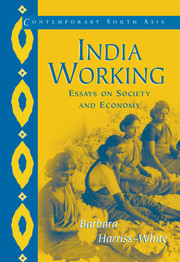Book contents
- Frontmatter
- Contents
- Preface and acknowledgments
- List of maps, figures and tables
- Glossary
- Abbreviations
- 1 Introduction: the character of the Indian economy
- 2 The workforce and its social structures
- 3 Indian development and the intermediate classes
- 4 The local State and the informal economy
- 5 Gender, family businesses and business families
- 6 India's religious pluralism and its implications for the economy
- 7 Caste and corporatist capitalism
- 8 Space and synergy
- 9 How India works
- 10 Postscript: proto-fascist politics and the economy
- Appendix 1 Liberalisation and Hindu fundamentalism
- Appendix 2 Relations between the developmental State and the intermediate classes
- Appendix 3 Roles of religious minorities in the Indian economy
- References
- Index of names
- Index of places
- Index of subjects
10 - Postscript: proto-fascist politics and the economy
Published online by Cambridge University Press: 06 July 2010
- Frontmatter
- Contents
- Preface and acknowledgments
- List of maps, figures and tables
- Glossary
- Abbreviations
- 1 Introduction: the character of the Indian economy
- 2 The workforce and its social structures
- 3 Indian development and the intermediate classes
- 4 The local State and the informal economy
- 5 Gender, family businesses and business families
- 6 India's religious pluralism and its implications for the economy
- 7 Caste and corporatist capitalism
- 8 Space and synergy
- 9 How India works
- 10 Postscript: proto-fascist politics and the economy
- Appendix 1 Liberalisation and Hindu fundamentalism
- Appendix 2 Relations between the developmental State and the intermediate classes
- Appendix 3 Roles of religious minorities in the Indian economy
- References
- Index of names
- Index of places
- Index of subjects
Summary
My book could easily have ended at this point, but over the period it has been written, variations on the term ‘fascist’ have been used in the media and by scholars in order to describe not only the increasingly active and violent communalist movements of the Sangh Parivar but also the regime ruling India at the turn of the millennium. Fascism is a kind of politics distinguished by ideology, although it draws on no single or coherent philosophy. Full-blooded fascist States have been ones espousing authoritarianism, militarism, a majoritarian kind of nationalism, racism, statolatry, elitism and the ruthless suppression of labour. Out of crises, they have developed institutions that contrive to unify apparently antagonistic class interests in the name of ‘the nation’. Analysts of fascist States have emphasised the primacy of politics. They also point to the considerable variety of political and ideological forms this politics has taken. Yet, while they also argue that there is no model economic base, comparative historical studies of the economies of fascist States in Europe and Latin America have shown there to be economic conditions and institutions that are necessary to give fascism state power – even if they are not by themselves sufficient for fascism to develop. Although it takes me outside the original project, outside the Indian economy and outside my conclusions, my last task needs to be to ask how the proto-fascist tendencies in India's politics and culture relate to the larger part of India's economic base, which is socially rather than state-regulated.
- Type
- Chapter
- Information
- India WorkingEssays on Society and Economy, pp. 248 - 255Publisher: Cambridge University PressPrint publication year: 2002



